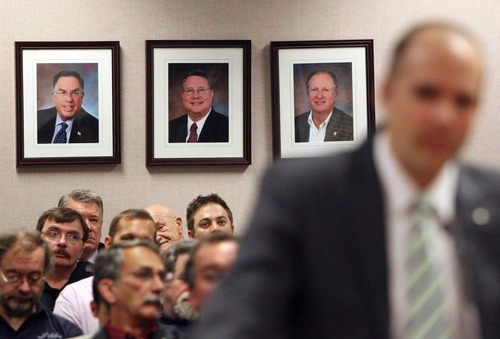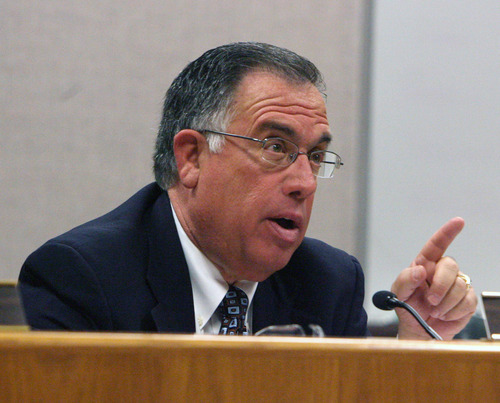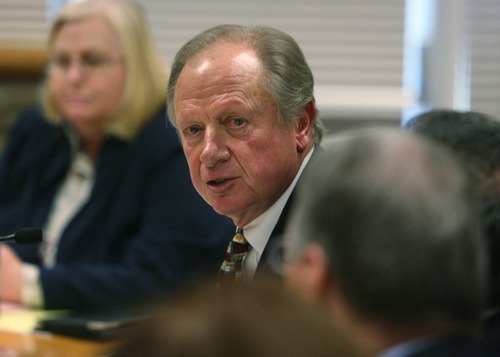This is an archived article that was published on sltrib.com in 2011, and information in the article may be outdated. It is provided only for personal research purposes and may not be reprinted.
Key lawmakers who have steadily imposed tighter restrictions on alcohol sales since Gov. Jon Huntsman Jr. left office about two years ago are poised to take greater control of the state board that regulates liquor.
New laws mandate that after being named by the governor, the liquor-control board chairman and the director of the Utah Department of Alcoholic Beverage Control would then face confirmation by the Senate.
So going forward, the leadership of the board will be directly in the hands of lawmakers, more than 80 percent of whom belong to The Church of Jesus Christ of Latter-day Saints, which urges its followers to eschew alcohol.
As it turns out, the lawmakers' control will be almost immediate because Executive Director Dennis Kellen, a 30-year department veteran under fire from key legislative leaders after a series of audits, is expected to announce his retirement soon. And at the end of the month, terms will expire for two of the five commissioners, including outspoken board Chairman Sam Granato.
Some liquor commissioners are so fearful of lawmakers, such as Senate President Michael Waddoups, R-Taylorsville, and Sen. John Valentine, R-Orem, pressuring Gov. Gary Herbert to appoint a hardliner that they have quietly asked him to name someone with moderate views on alcohol to replace Granato.
Granato, 61, who has bumped heads with the powerful Senate leaders over their efforts to restrict access to liquor on multiple levels, is unlikely to be reappointed to the board, but friends are lobbying Herbert to consider him for Kellen's job of directing the DABC on a day-to-day basis.
Last week, Granato, a Mormon, sold his deli and food supply business, Frank Granato Importing Co., to his children. But the chances of Granato, who as DABC board chairman has been an ally of the business community as it runs the gantlet of Utah's alcohol regulations, being named director are 50-50 at best.
In recent months he opposed lawmakers' directives to close profitable liquor stores and end the employment of about 100 workers, as called for in legislative audits designed to make up for state budget shortfalls. With Granato in the lead, others helped generate a public outcry against the closings, which put heat back on legislative leaders and prompted a delay in most of the closings.
"He is a strong and honest leader," Lisa Marcy, counsel for the Utah Hospitality Association, said of Granato. "He took courageous stands, most notably treating liquor stores and establishments that serve alcohol as the businesses that they truly are. Now, he just might be paying the price for those stands."
On the other hand, last week the Senate unanimously approved Granato's appointment to the state's economic development board. "Sam Granato is a good man and a good businessman," said Sen. Jerry Stevenson, R-Layton, who was chairman of the committee that drastically cut the liquor department's budget in a mandate to close stores. Herbert has since infused $1.4 million to keep as many as nine stores in operation through February 2012.
Under Granato's leadership, the DABC board has shown a sensitivity and understanding of problems businesses face, said Richard Golden, an attorney who appears frequently before the commission.
"With past boards, people who applied for liquor licenses were often treated like second-class citizens," said Golden. "With Granato, there was a much higher degree of civility, and an understanding of what it takes to make a business successful."
In 2007, then-Gov. Huntsman appointed Granato and departing board member Gordon Strachan, charging them to spearhead efforts aimed at loosening Utah liquor laws, which were among the nation's most restrictive.
Within two years of their appointments — and behind Huntsman's considerable effort — the state did away with its one-of-a-kind law that required people to purchase separate memberships for each bar they entered. Huntsman and his allies also backed efforts, long pushed by the hospitality industry, to allow restaurants and bars to serve stronger martinis and other mixed drinks.
The liquor board has made bold moves on its own. Commissioners eased penalties that required bars or restaurants to suspend operations for days or weeks for almost any violation of the state's liquor laws. Owners had complained they had no choice but to lay off all employees during those down times over the wrongdoing of a single worker. Now, owners with first-time or less-grave violations have a choice of paying a fine or closing temporarily. Commissioners also opened their deliberations to the public when awarding highly coveted liquor licenses. Those discussions had been closed to the public for as long as anyone could remember.
But lawmakers such as Valentine and Waddoups have pushed back, citing public safety concerns over drunk driving and teen drinking in their efforts to restrict consumption. They passed legislation that requires restaurants opening after January 2010 to hide bartenders and open bottles of liquor behind walls to keep them from public view. They also have refused to create more bar licenses, even though dozens of mayors and county commissioners have endorsed clubs opening in their jurisdictions in the name of economic development. There's such a shortage of club licenses that 15 applicants will be vying for one available license when the board meets this week.
Lawmakers also have given the commission the authority to once again close deliberations in deciding who gets liquor licenses. And they have agreed to allow bar and restaurant owners to sell licenses on the open market beginning in 2012, which in other states has bid up the price of permits to hundreds of thousands of dollars. None of that money would go to the state, which charges around $2,000 for licenses issued by the DABC.
Commissioners were so concerned over the latest round of legislation that in March they took the unprecedented step of asking Herbert to veto the enabling bill. Herbert signed the measure.
Twitter@DawnHouseTrib —
Utah Alcoholic Beverage Control Commission
On July 1, the chairman of the board that regulates alcohol sales will be appointed by the governor with the consent of the Senate. Members are:
Sam Granato, businessman and chairman; four-year term ends June 30.
Gordon Strachan, attorney and vice chairman; term ends June 30.
Richard J. Sperry, physician; term ends Oct. 31, 2013.
Jeffrey Wright, businessman; term ends Oct. 31, 2013.
Kathleen McConkie Collinwood, attorney; term ends June 30, 2014.







